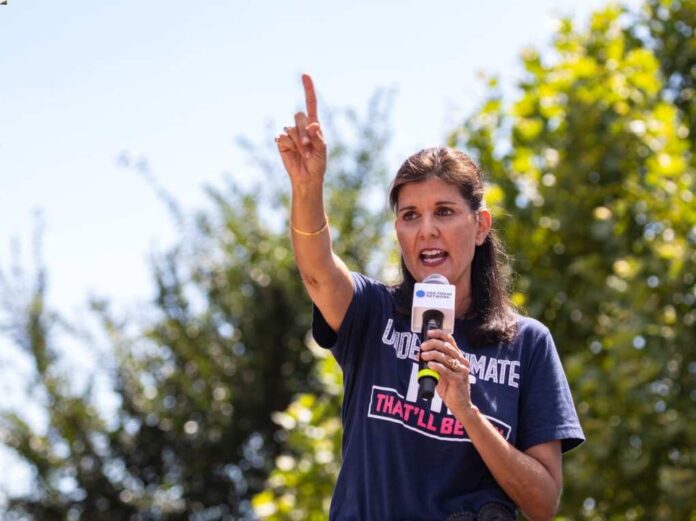South Carolina Governor Nikki Haley was not a target on the debate stage for the first Republican primary. Swimming alongside attention grabbers like Vivek Ramaswamy, Chris Christie, Mike Pence, Ron DeSantis, and, although not present, former president Donald Trump, Haley was a little fish in a big ocean.
But all that has changed. According to a recent CNN poll, Haley is currently ahead of Joe Biden by a significant margin of 6 percentage points, with Haley securing 49% of the support compared to Biden’s 43%. Notably, Haley is the only Republican candidate who has managed to establish a lead over the incumbent president, and this lead is comfortably outside the margin of error.
Haley’s appeal is particularly prominent among white, college-educated voters. This demographic has shown a tendency to lean towards Democratic candidates in recent election cycles, but Haley seems to be resonating with them through a moderate and more common-sense approach to the policies that matter to them the most.
Nikki Haley, the sole female contender in the GOP primary, stood out during the first debate by openly acknowledging the reality of climate change. She also took a critical stance on Republican spending practices and advocated for finding a middle ground regarding abortion.
Before the inaugural debate, Haley trailed behind Pence in the Republican nomination polls, as per RealClearPolitics’ average calculations. However, she has since managed to surpass him in popularity.
Commenting on her performance, David Niven, a University of Cincinnati political scientist, observed that Haley presented a pragmatic perspective during the first debate, especially when addressing issues like abortion. Her approach was rooted in practical politics rather than a strict party ideology.
Kall noted that Haley’s prior experience as the U.S. ambassador to the United Nations and her past participation in gubernatorial debates contributed significantly to her debate performance.
Heading into the second debate, Haley faces increased expectations, and she is likely to attract more attention. The “electability” argument will likely take center stage during the upcoming debate.
The question remains whether Haley will build on her momentum by maintaining her moderate stance or adopt a more right-leaning approach on policies, aligning herself with her conservative rivals to appeal to GOP voters.
Aaron Kall, director of debate at the University of Michigan, pointed out that Haley’s moderate positions on abortion and climate change might work to her advantage in a general election against Biden. Haley is proposing compromises on issues like late-term abortions and used her moment under the debate stage spotlight to acknowledge her stance that climate change is “real.”
Her views might appeal to moderate Republicans but could pose challenges in winning over more conservative primary voters. But, unlike most of her competition, Haley is a likable candidate who thrives on stage and enjoys interacting with her supporters.
Unlike her rivals on stage for the first Republican debate, Haley enjoyed a position of “offense” while the other candidates played “defense.” There were low expectations for the former U.N. ambassador heading into the event, and she was not a primary target during the debate.
But since the event, Nikki Haley’s national poll numbers have seen a significant increase, more than doubling their previous figures. Her current overall standing in the polls remains relatively modest at just 6.2%, according to RealClearPolitics.
Still, the poll numbers showing her outperforming Joe Biden are evidence of her electability, a position formerly held by Governor Ron DeSantis and one sure to be challenged heading into California’s second Republican debate.
During the August 23rd debate, Haley emphasized, “We have to look at the fact that three-quarters of Americans don’t want a rematch between Trump and Biden.” She added, “We have to face the fact that Trump is the most disliked politician in America. We can’t win a general election that way.”
Whether Haley’s moderate stance can unite the two parties and influence independent voters remains to be seen, but even Democratic strategists are taking note of her potential to be a contender in the 2024 election. Democratic strategist Michael Stratton noted that Haley’s view of Trump as “damaged goods” along with her advantage as a woman is appealing to many voters. Another Democratic strategist noted that his party would be “in trouble” if Haley was nominated.
Compared to Haley’s relatively easy run in the last debate, the second Republican debate, scheduled for September 27, 2023, at the Ronald Reagan Presidential Foundation and Institute in Simi Valley, California. will be anything but smooth sailing.
Like the sudden box office smash that no one saw coming, Haley has quietly moved from long-shot to a prickly thorn in the side of her fellow presidential hopefuls and Democrats alike.

















